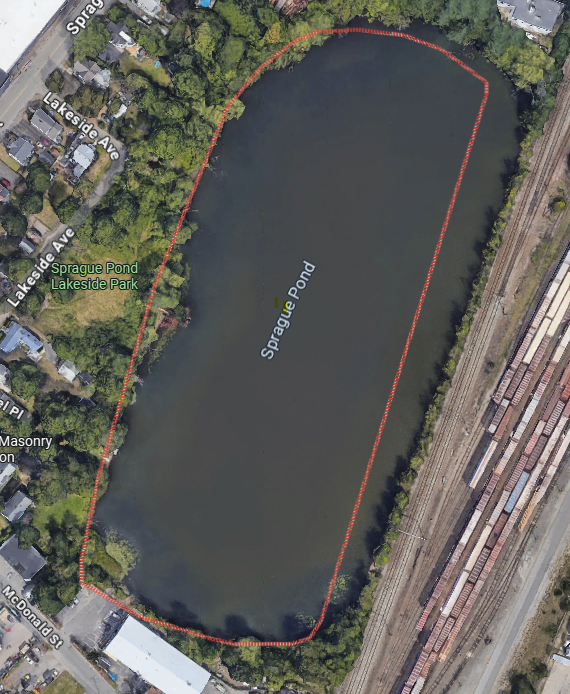Lifted - Health Advisory: Cyanobacteria Algae Blooming Sprague Pond
The Boston Public Health Commission (BPHC) is alerting residents that the Massachusetts Department of Public Health (DPH) has lifted the public health advisory issued for cyanobacteria algae bloom in Sprague Pond. This advisory was put into place on November 8. Analysis of testing samples taken in the area on November 20 and 26 demonstrated cyanobacteria levels below the state’s safe limit of 70,000 cells/milliliters (mL) of water.
BOSTON – November 8, 2024– The Boston Public Health Commission (BPHC) is alerting residents of a cyanobacteria algae bloom in Sprague Pond in the Hyde Park/Readville neighborhood of Boston. The Neponset River Watershed Association alerted BPHC of an observed cyanobacteria, a blue-green algae, bloom at Sprague Pond.
After being notified of a fish kill and green murky water by a member of Boston's Department of Parks and Recreation, the Neponset River Watershed Association sampled the pond and performed a test which identified the presence of cyanobacteria.
Sprague Pond is temporarily closed to the public. During the closure, residents should:
-
Avoid contact with the water.
-
Keep pets away from the water.
-
Avoid fishing and other activities in or near the water.
See the map with precise location below.
If you, your child, or your pet comes in contact with the water, rinse off immediately.
Blue-green algae can form harmful blooms in lakes, ponds, and rivers that make the water murky, and can sometimes make the water look like pea soup or paint. Blue-green algae blooms can produce toxins that may make people and pets sick. Toxins may be present within the algae cells or in the water.
For humans, the primary concern is ingestion of water containing blue-green algae while swimming. Direct skin contact with the blue-green algae and inhalation of water droplets containing blue-green algae or toxins is a secondary concern. For dogs, the primary concern is the ingestion of water containing blue-green algae or scum that has washed ashore or gotten onto their skin or fur.
Contact may cause skin and eye irritation, and inhalation can cause respiratory irritation and exacerbate pre-existing respiratory conditions. Ingestion can cause acute gastrointestinal symptoms, such as vomiting and diarrhea. If the blue-green algae are producing toxins, the health effects can be more serious, especially for children and small pets due to their smaller body weights. These health effects can include issues with the functioning of the liver, kidneys, and/or neurological systems. In severe cases toxins produced by blue-green algae can result in death.
Call your veterinarian immediately if your dog has been around an algae bloom and shows symptoms such as vomiting, staggering, drooling, or convulsions. These symptoms present themselves soon after exposure. Dogs have been known to eat the scum that washes ashore and ick scum out of their fur. In Massachusetts and in many other states, canine deaths have been documented due to the ingestion of harmful algae.
When will this advisory be lifted?
Algae blooms may last for weeks in the summertime or may disappear quite quickly. The Massachusetts Department of Public Health (DPH) will continue to monitor cyanobacteria algae levels in this area. DPH will conduct sampling for laboratory analysis once the bloom has dissipated. DPH requires two rounds of samples collected a week apart that are below the threshold of 70,000 cells/milliliter of water to determine that the advisory can be lifted.
If you have any questions, concerns, or would like more information, please call the Mayor’s Health Line at 617-534-5050.
ABOUT THE BOSTON PUBLIC HEALTH COMMISSION
Boston Public Health Commission (BPHC) is the country’s oldest health department. We envision a thriving Boston where all residents live healthy and fulfilling lives. To accomplish this, BPHC works in partnership with communities to protect and promote the health and well-being of all Boston residents, especially those impacted by racism and systemic inequities. Learn more about our work at boston.gov/bphc.
###



